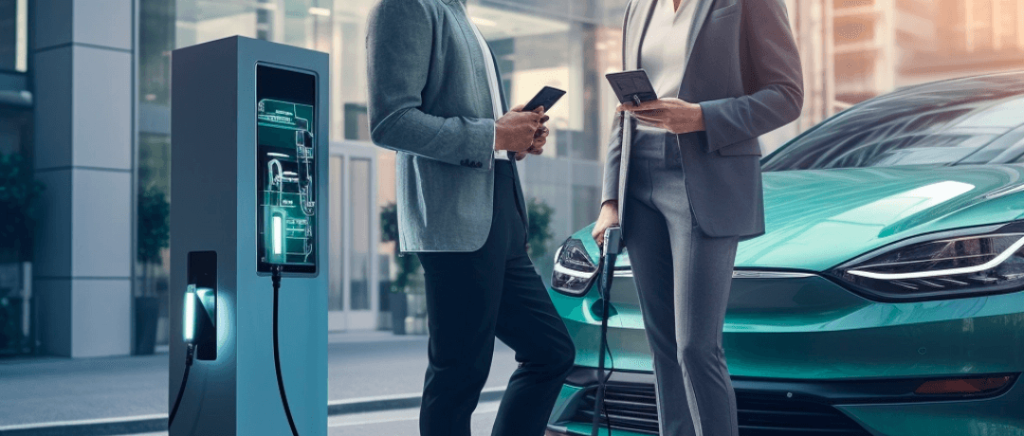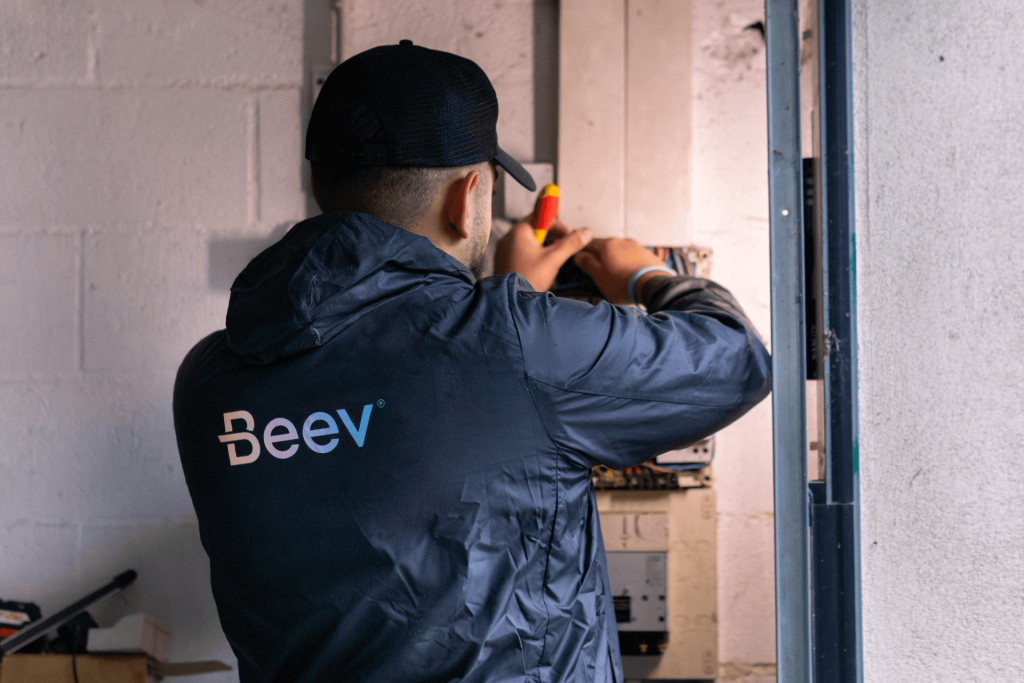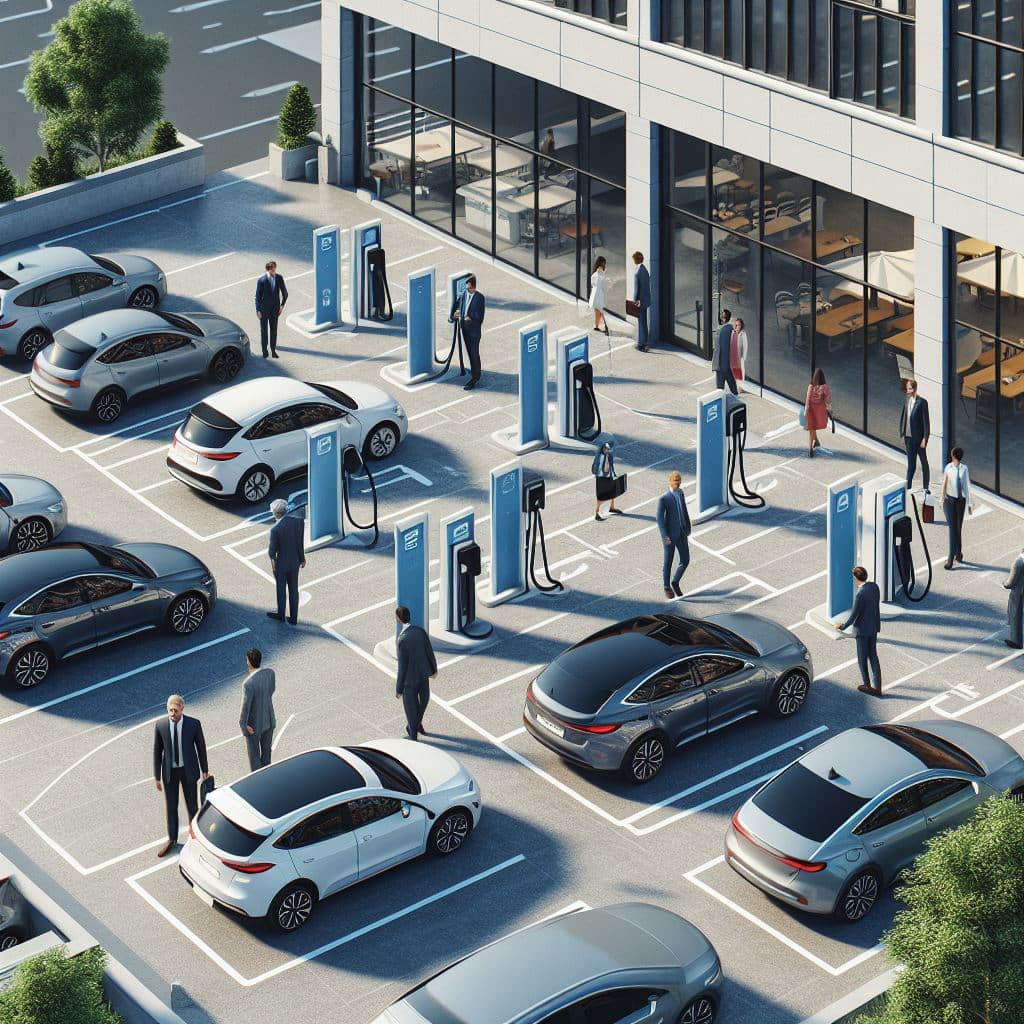Compulsory recharging stations for businesses: old and new buildings
Company charging points: what does the law say?
According to article L113-13 of the French Construction and Housing Codelegislation concerning the installation of charging stations in businesses varies according to the date of construction of the building and the size of the parking lot.
For older buildingsbuilt before January 1, 2025, existing parking lots with more than 20 spaces must be equipped with at least one charging point for electric or rechargeable hybrid cars, accessible to people with reduced mobility.
In addition, for every 20 parking spaces, an additional charging point is required. In the case of company parking lots with more than 200 spaces open to the public, at least two charging points must be provided for people with reduced mobility, including one reserved exclusively for PRMs.
For new buildingsFor new buildings, i.e. those for which planning permission has been granted after March 11, 2021, pre-equipment is mandatory.
In concrete terms, at least 1 parking space in 5 must be pre-equipped. In addition, 2% of these spaces, i.e. at least 1 space, must be accessible to people with reduced mobility. In parking lots with more than 200 spaces, at least 2 spaces must be equipped for PRMs, including one reserved exclusively for this category of user.
What is pre-equipment for recharging electric cars in the workplace?
The aim of this proactive approach is to prepare the company for the transition to electric mobility, while reducing the costs and potential disruption associated with a subsequent installation. In addition, it sends a strong signal in favor of sustainable development and commitment to more environmentally-friendly transport solutions, which can benefit the company's image and its relationship with its stakeholders.
In short, pre-equipment for electric car recharging is a very important step towards adapting to new mobility requirements, while promoting a sustainable energy transition.
Buildings covered by terminal pre-equipment obligations
The loi d'Orientation des Mobilités (LOM) of December 24, 2019 has introduced new provisions for new buildings for which the building permit application or prior declaration is submitted after March 11, 2021, as well as for those undergoing major renovations. From now on, there is no longer any distinction between industrial or tertiary buildings, public service buildings and commercial complexes.
All new buildings are now subject to the same charging station pre-equipment requirements. Since March 11, 2021, buildings undergoing "major renovations" are also subject to the same pre-equipment requirements for charging stations as new buildings.
A renovation is considered "major" if its cost represents at least a quarter of the building's value, excluding the cost of the land. However, if the cost of installing charging and connection systems exceeds 7% of the total cost of the renovation, the pre-equipment obligation does not apply.
For buildings owned and used by SMEs, as well as those in a category or zone exempt from these obligations, as defined by the PPE, these obligations do not apply.
Residential buildings
Certain parking requirements apply to residential buildings. Here are the conditions under which these obligations apply:
- The building must be new or undergo a major renovation that includes the parking lot or its electrical installation.
- The parking lot must have more than 10 parking spaces.
- The parking area must be inside the building or adjacent to it. This means it must be located on the same land unit and have a functional relationship with the building.
Whatever the size of the parking lot, 100% of all parking spaces must be pre-equipped. In other words, every parking space must be equipped in accordance with these requirements.
Non-residential buildings
Non-residential buildings are subject to obligations in the following cases:
- The building is newly constructed or undergoing major renovation, including parking or electrical installation.
- The parking lot has more than 10 parking spaces.
- The parking lot is located inside the building or directly adjacent to it, meaning that it is on the same plot and has a functional relationship with the building.
Regardless of the size of the parking lot, a mandatory minimum pre-equipment rate of 20% of all parking spaces is required, of which 2%, with a minimum of one charging point, must be accessible to people with reduced mobility (PRM).
Mixed-use buildings with predominantly residential use
For residential buildings, obligations are in place under the following conditions:
- The building is new or undergoing major renovation.
- The parking lot has more than 10 parking spaces.
- The parking lot is located inside or adjacent to the building, which means it shares the same property and is functionally linked to the building.
In these cases :
- If the parking lot has between 11 and 20 spaces, 100% of parking spaces must be pre-equipped.
- For a number of parking spaces exceeding 20, the minimum equipment requirement concerns 100% of parking spaces primarily for residential use.
For example, if a parking lot has 100 spaces for residents and 100 spaces for non-residents, then 100% of the 100 spaces reserved for residents are concerned.
Mixed-use buildings with predominantly non-residential use
For non-residential buildings, requirements must be met in the following cases:
- The building is newly constructed or undergoing major renovation.
- The parking lot has more than 10 parking spaces.
- The parking facility is located inside or in the immediate vicinity of the building, i.e. on the same property and functionally linked to the building.
In these situations :
- If the parking lot has between 11 and 20 spaces, a mandatory minimum pre-equipment rate of 20% of all parking spaces is required, of which 2%, with a minimum of one charge point, must be accessible to people with reduced mobility (PRM).
- For more than 20 places, the same minimum pre-equipment rate of 20% applies to parking spaces intended primarily for non-residential use.
For example, if the parking lot has 100 spaces for residents and 100 spaces for non-residents, then 20% of the 100 non-resident spaces are affected.
Summary table of charging station pre-equipment obligations
| OBLIGATIONS | |||
| No. of spaces to be pre-equipped for parking lots with more than 10 spaces | |||
| Between 11 and 20 | > 20 | ||
| New residential buildings (with or adjacent to parking lots) or those undergoing major renovation, including the parking lot or its electrical installation. | 100% | ` | |
| New or substantially renovated non-residential buildings (parking lots inside or adjoining), including the parking lot or its electrical installation. | 20% of spaces of which 2%, with a minimum of one charging point, are accessible to PRMs | ||
| New mixed-use buildings or those undergoing major renovation* (parking lots inside or adjacent to the building) for predominantly residential use. | 100% | The same provisions apply pro rata to the number of spaces reserved for residential or non-residential use. | |
| New mixed-use buildings or those undergoing major renovation* (parking lots inside or adjoining) for predominantly non-residential use. | 20% of spaces of which 2%, with a minimum of one charging point, are accessible to PRMs |
Company charging stations: power requirements

In accordance with the decree of July 13, 2016, companies are required to select electric charging stations with a minimum output of 22 kW. However, under the provisions of the decree of February 3, 2017, they have the option of selecting bollards with a power rating of between 7.4 kW and 22 kW, provided they are powered by renewable energy sources, such as solar panels, generally.
It is important to note that the law of March 10, 2023 requires every company or local authority to install solar shading if the ground surface of their parking area exceeds 500 square meters. This obligation takes effect from 1ᵉʳ July 2023. Companies thus have a clear interest in combining photovoltaic shades with charging stations.
What are the advantages for you as a company of subsidizing charging stations?
What is the Advenir program?
To encourage your commitment to the ecological transition as an SME, you have the opportunity to take advantage of the Advenir program. Initiated in 2017 by ADEME, this program grants bonuses to companies wishing to install charging stations.
In collaboration with local authorities and players in the energy sector, Advenir combines energy saving certificates (CEE) and public subsidies to promote sustainable mobility. In this way, it offers comprehensive, tailor-made support for every project. Ultimately, the aim is to support the energy transition by financing the installation of120,000 charging points by 2025.
The amount of the subsidy is determined individually for each project, based on an aid rate that varies according to the type of parking lot, with ceilings ranging from €600 to €960,000 per recharging point:
- A rate of 50% is applied for a pre-tax ceiling per charging point ranging from €2,200 to €960,000, intended for private parking for truck fleets.
- A rate of 30% is applied for a ceiling per charging point, excluding taxes, ranging from €1,000 to €2,700, for a private parking lot open to the public.
- A rate of 30% is also applied, up to a pre-tax ceiling of €1,000 per recharging point, for a private parking lot open to the public (intermediate target).
- Lastly, a rate of 20% is applied up to a maximum of €600 per recharging point, excluding tax, for fleets and employees of short-term vehicle rental companies.
Benefits in kind: what are they?
The management of the benefit in kind (AEN) relating to the cost of recharging electric vehicles in the workplace is attracting particular attention from both employers and employees. Historically, prior to the introduction of the current system in force until December 31, 2024, the employer's payment of charging costs was considered a benefit in kind, subject to income tax for the employee. This situation raised questions about the tax treatment of this benefit.
PLEASE NOTE: FROM JANUARY 1ᵉʳ, 2025, FREE CHARGING OF ELECTRIC VEHICLES AT WORK WILL NO LONGER BE AVAILABLE TO EMPLOYEES.
Fortunately, in order to encourage the adoption of electric vehicles and promote the energy transition, the French government has introduced a 50% deduction to be applied to the benefit-in-kind corresponding to recharging costs borne by the employer, with a ceiling set at €1,800 per year. This measure is designed to mitigate the tax impact for employees using their electric vehicle for business travel and benefiting from a recharging point paid for by their employer.
It should be emphasized, however, that this NEA reduction applies exclusively to charging carried out at the workplace. Personal or professional use outside working hours is not taken into account. This provision is designed to prevent abuse and ensure that only recharging costs linked to the professional use of the electric vehicle are taken into account when calculating the benefit in kind.
In short, this scheme represents a pragmatic solution for stimulating the adoption of electric vehicles in the workplace, while reducing the tax impact for employees. It demonstrates the government's commitment to promoting more sustainable practices, and contributes to the energy transition and the fight against climate change.
Improved employee experience and enhanced employer image
Offering electric vehicle recharging at your site has several advantages for enhancing the employee experience. By offering this convenience, employees can optimize their day by avoiding detours to refuel, increasing their satisfaction and loyalty to the company.
What's more, this initiative provides a competitive advantage in attracting talent, particularly those sensitive to sustainable development, thus strengthening the employer brand. By encouraging physical presence at work with a practical recharging solution, companies improve their brand image while reducing travel-related costs. In shortinstallation of on-site electric vehicle for electric vehicles optimizes working time, enhances brand image and reduces costs, underlining the importance of making companies aware of these benefits and encouraging them to adopt the practice.
Compulsory installation of charging stations by a qualified electrician (IRVE)

Electric vehicle charging stations (IRVE) must be installed by a qualified electrician to ensure safety and compliance with standards. Handling electricity presents potential risks, and incorrect installation can compromise the safety of both users and electrical installations. Call in a qualified electrician specialized in IRVE ensures that the installation complies with current regulations, and that the charging stations function properly.
What's more, you'll also benefit from expert advice on choosing the optimum location for your charging station, to ensure safe and efficient use. In short, it's imperative to have charging stations installed by a qualified electrician to ensure the safety and performance of this equipment.
Since January 2017, the law has required that any charging station installation above 3.7 kilowatts (kW) in power must be carried out by an electrician holding the IRVE qualification. For lower-power charging stations, the intervention of an IRVE electrician is not mandatory, but is still recommended to guarantee the quality of the installation. The aim of this measure is to guarantee the safety of installations and ensure they comply with standards.
Conclusion
In conclusion, the obligation to install electric vehicle charging stations in companies is an essential step towards promoting sustainable mobility. This initiative, supported by precise regulations and government incentives such as the Advenir Program, offers considerable benefits, from improved employee experience to enhanced brand image. By working with qualified electricians, companies can ensure compliance with safety standards and maximize the benefits of this transition to electric mobility, while helping to combat climate change.
For more information, we've put together a guide to this topic to explore the different aspects in depth:
If you would like to know more about the charging station tax credit at 2024please consult our article on the subject.
Read our article about :
Beev is available to provide any information or advice required for the installation of charging stations for professionals or businesses.

































